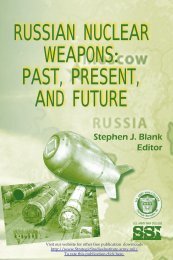The United States and China in Power Transition - Strategic Studies ...
The United States and China in Power Transition - Strategic Studies ...
The United States and China in Power Transition - Strategic Studies ...
You also want an ePaper? Increase the reach of your titles
YUMPU automatically turns print PDFs into web optimized ePapers that Google loves.
neighbors, especially the Southeast Asian nations,<br />
<strong>and</strong> focus on its economic development. However,<br />
30 years afterwards, <strong>Ch<strong>in</strong>a</strong> realized that it had paid a<br />
heavy price for this policy—<strong>Ch<strong>in</strong>a</strong> left its disputed territories<br />
largely unattended for another 30 years. (<strong>The</strong><br />
first 30 years was from 1949 to 1978 when the Ch<strong>in</strong>ese<br />
were condemned to repeated political movements,<br />
<strong>and</strong> the second 30 years from 1978 to 2008 when<br />
<strong>Ch<strong>in</strong>a</strong> turned its attention to economic development.)<br />
<strong>Ch<strong>in</strong>a</strong>’s territorial disputants, however, got 3 decades<br />
to re<strong>in</strong>force their effective control of the disputed territories.<br />
Indeed, Vietnam <strong>and</strong> Malaysia have turned<br />
their possessions <strong>in</strong>to popular ocean vacation resorts,<br />
fish<strong>in</strong>g outposts, ocean natural resources exploration<br />
stations, or military garrisons. Permanent structures<br />
such as airplane runways, seaports, offices, <strong>and</strong> hous<strong>in</strong>g<br />
are well <strong>in</strong> place. 115 It would be very difficult, if<br />
not impossible, for <strong>Ch<strong>in</strong>a</strong> to negotiate the “return” of<br />
those isl<strong>and</strong>s.<br />
<strong>The</strong> policy of shelv<strong>in</strong>g dispute-promot<strong>in</strong>g jo<strong>in</strong>t<br />
development is now under heavy criticism <strong>in</strong> <strong>Ch<strong>in</strong>a</strong>.<br />
Many Ch<strong>in</strong>ese feel that <strong>Ch<strong>in</strong>a</strong> is foolish to pursue<br />
such a one-sided policy. 116 <strong>The</strong>y argue that <strong>Ch<strong>in</strong>a</strong> is<br />
the only one to follow this policy. <strong>The</strong> other claimants<br />
welcome <strong>Ch<strong>in</strong>a</strong>’s “self restra<strong>in</strong>t,” but none feels obligated<br />
to reciprocate <strong>in</strong> k<strong>in</strong>d (much like <strong>Ch<strong>in</strong>a</strong>’s “altruist”<br />
calls discussed earlier, such as the Five Pr<strong>in</strong>ciples<br />
of Peaceful Coexistence <strong>and</strong> the Harmonious World<br />
concept that expects other nations to practice altruism<br />
<strong>and</strong> exercise self constra<strong>in</strong>t <strong>in</strong> <strong>in</strong>ternational affairs<br />
even though few, if any, would do it wholeheartedly).<br />
Indeed, all of the other claimants know that <strong>Ch<strong>in</strong>a</strong>’s<br />
policy is based on the premise that the sovereignty of<br />
those isl<strong>and</strong>s belongs to <strong>Ch<strong>in</strong>a</strong> (主权属我). <strong>Ch<strong>in</strong>a</strong>, for<br />
its part, has always ma<strong>in</strong>ta<strong>in</strong>ed this bottom l<strong>in</strong>e <strong>in</strong> its<br />
133

















